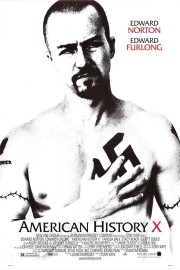American History X
“American History X” is fundamentally, a film about redemption, and it follows along many of the same formulas for such a story. But it’s also a potent story about intolerance, rising above hate, and finding a little bit of sense in this senseless world. In intensity, it’s the equal of Spike Lee’s brilliant “Do the Right Thing,” even if it makes things feel black-and-white morally at times like D.W. Griffith did in his masterpiece “Intolerance.” Director Tony Kaye has learned a few lessons from both, cribbing from Lee’s bold stylizations visually (and letting composer Anne Dudley bring it home with an overbearing but effective score) while also pointing towards better things like Griffith tended to do.
That doesn’t make the film bad- just a bit derivative. You’ll be hard pressed to take your eyes off the screen for long in this 118 minute stunner, starting with a brutal hate crime (shot in bold black-and-white) and ending with a quote about equality even after the cycle of violence is continued with the death of a main character. This movie had more to say to me about the seeds of racism and hate than the whole of Paul Haggis’ Oscar-winning “Crash” because it faced the people who traffic in such feelings head-on and without remorse. At the center of it all is a performance by Edward Norton that ranks with his best, and netted a much-deserved Oscar nomination. In the 10 years since…how has he not won yet?
Norton stars as Derek Vinyard, the right-hand man in a group of white supremacists in L.A. who gets sent to prison for three years after the brutal murder of two black guys who were getting retribution for an on-court humiliation earlier at his hands. But Derek’s story is framed by the story of his younger brother Danny (“Terminator 2’s” Edward Furlong, also terrific), who’s headed down the same path Derek is. A history teacher named Sweeney (Avery Brooks in a wonderful role)- who inspired Derek before he lost his way- sees a chance at saving Danny from his brother’s path, and hopes that the just-released Derek can help steer his younger brother away from the same mistakes he made. Family friend Seth (Ethan Suplee, in a surprising performance by anyone who’s watched him on “My Name is Earl”) and Derek’s girlfriend (played by Fairuza Balk) want things the way they were before prison, but a reformed Derek- who learned a little humility and compassion for others (like his laundry detail co-worker played by Guy Torry in a standout turn)- wants none of it. But it’s hard to live down one’s past, as both brothers are going to figure out the hard way.
The screenplay by David McKenna seems like it should follow Danny’s descent into hate more than it does Derek’s, but it’s not hard to see Danny’s right away- he looks up to his brother, even if you get the feeling he’s probably smart enough to figure out how stupid it all is. Derek’s is more important, to see how this obviously bright kid became such a potent role model for his brother, a larger-than-life leader that nonetheless is completely down-to-earth, and no less charismatic for it. We need to see how supremacist leaders like Stacy Keach’s single-minded Cameron rely on the intelligence, and impressionable minds, of kids like Derek- easily swayed into hateful thoughts by his firefighter father at the dinner table (his influence over his son was sealed when he was killed by two black drug addicts while putting out a fire)- to spread the good word about the evils of racial equality. A rage-fueled attack by Derek and his crew on a Korean-owned, immigrant-employed grocery store in the neighborhood is as hard to watch as anything in “Schindler’s List.” That we focus more on Derek’s story and transformation more than we do Danny’s, and yet both stories exert an equal hold on the audience is one of the film’s strengths, leaving one to wonder how the film would’ve been different had Kaye- who also edited and shot the film, which has an immediacy and attention to character that’s completely correct for the subject- been able to have his way in the editing. A controversy came up in post-production claiming Norton re-edited the film against Kaye’s wishes. Whether he did or not, the film as it stands is a raw wound of a film that can’t be ignored. That’s a compliment, by the way.
At the center of the film is Norton, who by this time was already considered one of his generation’s best actors after his 1996 trifecta of “The People Vs. Larry Flynt,” “Everyone Says I Love You,” and his Oscar-nominated turn in “Primal Fear.” This film, however, took Norton’s work up a notch, pointing the way towards later live-wire turns in Spike Lee’s underrated “The 25th Hour” and David Fincher’s time-capsule of a satire “Fight Club.” (It also lead to a reputation for being difficult, which has led to similar issues being brought up on “The Incredible Hulk” and “The Italian Job,” but it’s hard to see Norton’s iconclastic attitude being a bad thing considering his work in those films and others.) Norton’s fearlessness as an actor vibrates through every frame of the film, whether he’s railing off against other races on TV after his father’s murder, standing up to Cameron at a white power rally, or- in a painfully-shot sequence- getting raped in the shower by his own in prison after he chooses to sit alone rather than with them. We need to see why Derek became such a strong role model for his brother, even when he attacks his sister at the dinner table, and how far he had to come back from in order to be able to maybe lead his brother in a different direction he took. Norton’s determination in the role of mentor and savior is impossible to shake. So is the movie.










